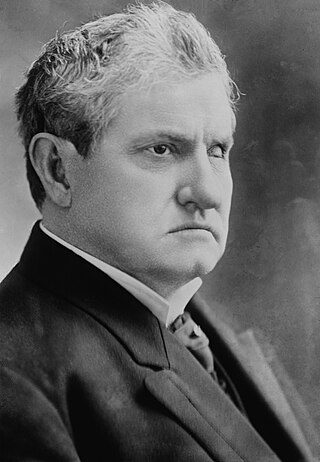
Benjamin Ryan Tillman was a politician of the Democratic Party who served as governor of South Carolina from 1890 to 1894, and as a United States Senator from 1895 until his death in 1918. A white supremacist who opposed civil rights for black Americans, Tillman led a paramilitary group of Red Shirts during South Carolina's violent 1876 election. On the floor of the U.S. Senate, he defended lynching, and frequently ridiculed black Americans in his speeches, boasting of having helped kill them during that campaign.

The 1986 United States Senate elections were elections for the United States Senate. Held on November 4, in the middle of Ronald Reagan's second presidential term, the 34 seats of Class 3 were contested in regular elections. The Republicans had to defend an unusually large number of freshman Senate incumbents who had been elected on President Ronald Reagan's coattails in 1980. Democrats won a net of eight seats, defeating seven freshman incumbents, picking up two Republican-held open seats, and regaining control of the Senate for the first time since January 1981. This remains the most recent midterm election cycle in which the sitting president's party suffered net losses while still flipping a Senate seat.

The 1984 United States Senate elections were held on November 6, with the 33 seats of Class 2 contested in regular elections. They coincided with the landslide re-election of President Ronald Reagan in the presidential election. In spite of the lopsided presidential race, Reagan's Republican Party suffered a net loss of two Senate seats to the Democrats, although it retained control of the Senate with a reduced 53–47 majority. Democrats defeated incumbents in Illinois and Iowa, and won an open seat in Tennessee, while Republicans defeated an incumbent in Kentucky.

The 1980 United States Senate elections were held on November 4, coinciding with Ronald Reagan's victory in the presidential election. The 34 Senate seats of Class 3 were contested in regular elections. Reagan's large margin of victory over incumbent Jimmy Carter gave a huge boost to Republican Senate candidates, allowing them to flip 12 Democratic seats and win control of the chamber for the first time since the end of the 83rd Congress in January 1955.

The 1974 United States Senate elections were held on November 5, with the 34 seats of Class 3 contested in regular elections. They occurred in the wake of the Watergate scandal, Richard M. Nixon's resignation from the presidency, and Gerald Ford's subsequent pardon of Nixon. Economic issues, specifically inflation and stagnation, were also a factor that contributed to Republican losses. As an immediate result of the November 1974 elections, Democrats made a net gain of three seats from the Republicans, as they defeated Republican incumbents in Colorado and Kentucky and picked up open seats in Florida and Vermont, while Republicans won the open seat in Nevada. Following the elections, at the beginning of the 94th U.S. Congress, the Democratic caucus controlled 60 seats, and the Republican caucus controlled 38 seats.

The 1968 United States Senate elections were elections for the United States Senate. Held on November 5, the 34 seats of Class 3 were contested in regular elections. They coincided with the presidential election of the same year. The Republicans picked up five net seats in the Senate. This saw Republicans win a Senate seat in Florida for the first time since Reconstruction.

The 1966 United States Senate elections were elections on November 8, 1966, for the United States Senate which occurred midway through the second term of President Lyndon B. Johnson. The 33 seats of Class 2 were contested in regular elections. Special elections were also held to fill vacancies. With divisions in the Democratic base over the Vietnam War, and with the traditional mid-term advantage of the party not holding the presidency, the Republicans took three Democratic seats, thereby breaking Democrats' 2/3rds supermajority. Despite Republican gains, the balance remained overwhelmingly in favor of the Democrats, who retained a 64–36 majority. Democrats were further reduced to 63–37, following the death of Robert F. Kennedy in June 1968.
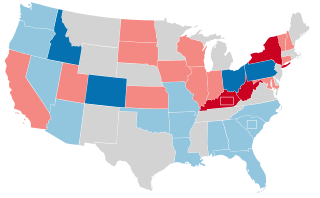
The 1956 United States Senate elections were elections for the United States Senate that coincided with the re-election of President Dwight D. Eisenhower. The 32 seats of Class 3 were contested in regular elections, and three special elections were held to fill vacancies. Although Democrats gained two seats in regular elections, the Republicans gained two seats in special elections, leaving the party balance of the chamber unchanged.

The 1932 United States Senate elections coincided with Democrat Franklin D. Roosevelt's landslide victory over incumbent Herbert Hoover in the presidential election. The 32 seats of Class 3 were contested in regular elections, and special elections were held to fill vacancies.

The 1892 South Carolina gubernatorial election was held on November 8, 1892 to select the governor of the state of South Carolina. Governor Ben Tillman was renominated by the Democrats and was elected in the general election to a second two-year term.

The 1918 South Carolina gubernatorial election was held on November 5, 1918, to select the governor of the state of South Carolina. Robert Archer Cooper emerged from the crowded Democratic primary and ran unopposed in the one-party state's general election to become the 93rd governor of South Carolina.
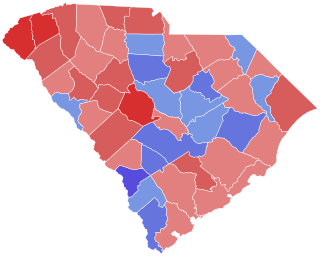
The 2008 United States Senate election in South Carolina was held on November 4, 2008 to elect a member of the United States Senate to represent the State of South Carolina. Incumbent Republican U.S. Senator Lindsey Graham won election to a second term.
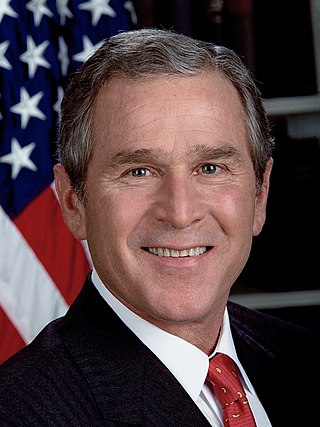
From January 24 to June 6, 2000, voters of the Republican Party chose its nominee for president in the 2000 United States presidential election. Texas Governor George W. Bush was selected as the nominee through a series of primary elections and caucuses culminating in the 2000 Republican National Convention held from July 31 to August 3, 2000, in Philadelphia, Pennsylvania.

The 1913 South Carolina United States Senate election was held on January 28, 1913, when the South Carolina legislature met and unanimously ratified the results of the August 27, 1912 primary. Incumbent Senator Ben Tillman was re-elected to a fourth term in office.

The 1897 South Carolina United States Senate election was a unanimous election of the Democratic nominee on January 26, 1897 to select the U.S. Senator from the state of South Carolina. The Democratic primary election was held on August 26, 1896 and September 9. Prior to the ratification of the 17th Amendment to the United States Constitution, U.S. Senators were elected by the state legislature and not through the direct election by the people of the state. However, the Democratic Party of South Carolina organized primary elections for the U.S. Senate beginning in 1896 and the General Assembly would confirm the choice of the Democratic voters. Conservative Democratic Joseph H. Earle won the Democratic primary and was elected by the General Assembly for a six-year term.

The 1903 South Carolina United States Senate election, held January 27, 1903 to select the U.S. senator from the state of South Carolina, was predetermined by the Democratic Party primary election held on August 26, 1902, and September 9. Democrats were so overwhelmingly dominant that their nomination was tantamount to the general election.

The 1896–97 United States Senate elections were held on various dates in various states. As these U.S. Senate elections were prior to the ratification of the Seventeenth Amendment in 1913, senators were chosen by state legislatures. Senators were elected over a wide range of time throughout 1896 and 1897, and a seat may have been filled months late or remained vacant due to legislative deadlock. In these elections, terms were up for the senators in Class 3.
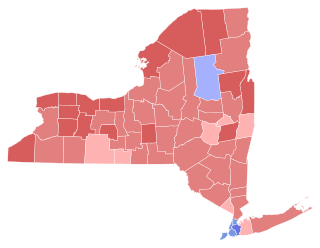
The 1914 United States Senate election in New York was held on November 3. Incumbent Republican Senator Elihu Root chose not to seek re-election. James Wolcott Wadsworth Jr. was elected to a succeed Root, defeating Democrat James Watson Gerard.

The 1972 United States Senate election in Louisiana was held on November 9, 1972.
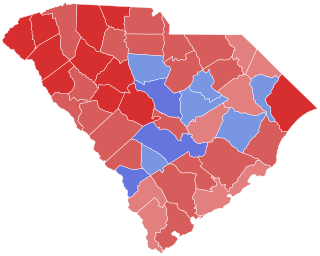
The 2022 United States Senate election in South Carolina was held on November 8, 2022, to elect a member of the United States Senate to represent the state of South Carolina. Incumbent senator Tim Scott won reelection to a second full term, defeating state representative Krystle Matthews. This was the third consecutive election for this seat where both major party nominees were black.


















